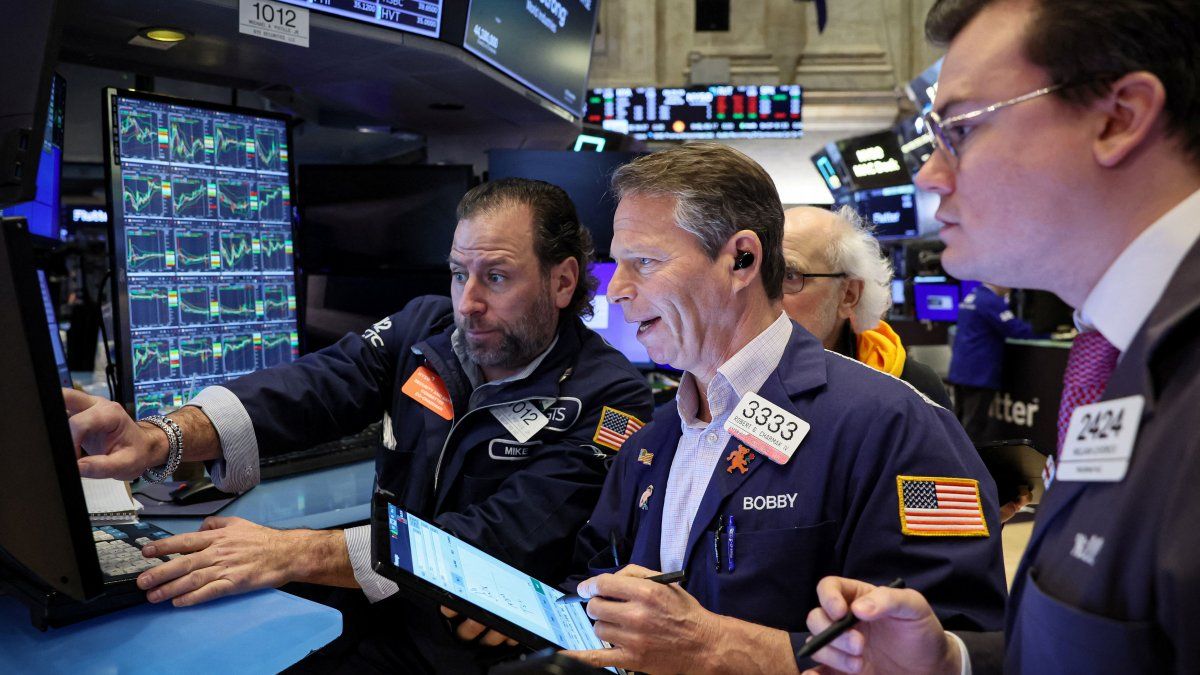Wall Street’s main stock indices rose this Thursdaydriven by weekly jobless claims data that offered new evidence of a weakening US labor market, and renewed expectations that the Federal Reserve will cut interest rates during the current year.
The Dow Jones Industrial Average ended at 39,387.76 points, gaining 0.85%; the S&P500 stood at 5214.08 points with an increase of 0.51%; and the Nasdaq Composite appreciated 0.27%, reaching 16,346.26 points.
The technology companies revved up the wheel to leave behind a slow opening. Thus, benchmark indices rose from morning trading, with mega-cap stocks Amazon (+1%), Microsoft (+0.44%), Alphabet (0.05%) and Apple (+1.85%) to the head.
The labor market weakens
The number of Americans filing new claims for unemployment benefits rose more than expected last week, as the labor market weakens. Initial claims for state unemployment benefits increased by 22,000 to a seasonally adjusted 231,000 in the week ending May 4, the Labor Department reported Thursday.
According to economists, the forecast was 215,000 applications in the last week, while these have fluctuated between 194,000 and 225,000 for much of the year. Part of last week’s increase was likely due to seasonal issues, since spring break is over.
The weakening labor market has put two rate cuts by the Federal Reserve back on the table this year. Financial markets expect the US central bank to begin its easing cycle in September.
“I would view the jobless claims as favorable data for the Fed, moving in the right direction toward slowing the economy, which should help reduce inflation.”said Charlie Ripley, senior investment strategist at Allianz Investment Management.
Attention will now turn to next week’s producer and consumer price readings, as well as comments from Fed policymakers looking for clues about the path of U.S. rates.
Actions and results
While, 10 of the 11 major S&P sectors rose, led by a 1.7% rise in the housing index.
Data center operator Equinix advanced 12% after its first quarter results were released.
Elsewhere, chip designer Arm Holdings fell nearly 2% as its full-year revenue forecast fell short of expectations. Its biggest competition, Nvidia, also dropped 2%.
Roblox plunged 22% after the video game platform cut its annual booking forecast, in a sign that people were cutting back on spending amid an uncertain economic outlook and high levels of inflation.
Robinhood shares fell 3.14% even though the online brokerage beat first-quarter earnings estimates, thanks to strong cryptocurrency trading volumes and rate hikes that boosted its net interest income.
Oil on the decline
Meanwhile oil, the raw material for transportation fuels, has declined rapidly this week after an average increase of 28% in the last quarter.
Crude oil peaked in September 2023 due to OPEC+ production cuts, voluntary reductions from Saudi Arabia and export restrictions from Russia.
Earlier this week, JPMorgan analysts predicted that global oil demand would slow this quarter after crude prices recently touched $90 a barrel.
Source: Ambito
I am a 24-year-old writer and journalist who has been working in the news industry for the past two years. I write primarily about market news, so if you’re looking for insights into what’s going on in the stock market or economic indicators, you’ve come to the right place. I also dabble in writing articles on lifestyle trends and pop culture news.




